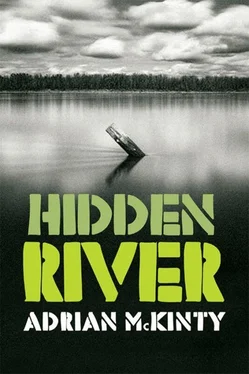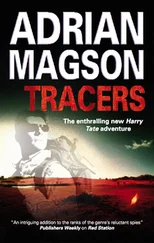“No, I’m on the phone, I’m busy, it will have to be another time,” he said, his voice rising half an octave, becoming more aggressive.
I didn’t want to upset him that much. He was important to the case. I nodded, took his card, walked back to the elevator, left the office. When I got outside I dialed the number on the card. The operator informed me that this number had been disconnected.
It didn’t matter. If he didn’t send the note, then at the very least he knew something that he was having a hard time trying to hide. I would have to see him again.
I sat for a minute in the pedestrian mall. A busker came up to me and began singing Phish songs. I got the bus back to Denver, returned to the motel. John appeared, haggard, out of sorts. He hadn’t been able to get into Victoria’s building to interview the neighbors. Because of the murder, they had beefed up security, you needed the code to enter.
“John, you just press all the buttons and someone will buzz you in,” I said, exhausted now.
John was chagrined, but excited by my news. His voice poured in my ear and I listened to him.
“Alex, we should press our advantage, we should see him tonight, as soon as possible, crack him, you’ve rumbled him, see? You did it, mate. We’ll go over there together, sort it out, make him come with us to the peelers, free an innocent man, get the investigation on the right track. Crack the case, get a big bonus from Mr. Patawasti.”
John spoke and I stared, tired, through the windows. The sun in the sky, heavy, loitering. Planes. Helicopters.
Oh, take from me this day. Unmake it. Please. All it needs is for me to say, no, John, tomorrow will do. All it takes is for me to say no. In Irish there is no word for “no.” Maybe that’s the trouble. All I have to do is refuse and none of the bad stuff goes down.
But I didn’t say no. I was knackered from the rave and the sleepless night. I was weak.
I said nothing.
I took the easy way.
“Come on,” John said and helped me to my feet.
Another of those wee things that fuck you up. Little things with big consequences. Paul of Tarsus has a fit and Christianity is born. Franz Ferdinand’s chauffeur turns left instead of right and a hundred million Europeans die.
Poor John. I will not be there at your tide burial. Tractors and the cries of seagulls will wing you to your resting place. Seagulls a thousand miles from the ocean, in the landfill on the road to Kansas, your body rotting there under earth and garbage piles.
Lead on chaos, pandemonium, death. And weary, I muttered:
“Ok, eejit. Let’s go.”
* * *
We went to the bus station at three o’clock and took turns staking it out. I read the newspapers on John’s watch. Very different from the UK. In America, the main story wasn’t the Oklahoma bombing, which had taken place just two months ago and killed 168 people. No, it was all about a former American football player I had never heard of, O. J. Simpson, who apparently had murdered his wife and was now on trial in California.
In Colorado the big story was the continuing drought, the bankruptcy of several ski resorts, and the dreary prospects for a long, hot summer.
Klimmer showed up at the Denver bus station just after four-thirty. He was carrying a briefcase and didn’t look nervous in the least. John and I followed him. We were both wearing baseball caps and sunglasses. We didn’t stand out.
He walked to the Sixteenth Street pedestrian mall and cut up through the park next to the hideous central library.
It was our first chance to really see Denver in the daylight. It looked ok. Dead grass in the parks, granite government buildings, a world trade center, office towers, a university building, several imposing masonic lodges within a block of the state capitol, which must have given conspiracy theorists food for thought.
Klimmer resided in a large apartment building overlooking Cheesman Park in the Capitol Hill section of Denver. John pointed out that he lived only a couple of hundred yards from Victoria Patawasti’s building, though whether this meant something or not, I didn’t know.
We waited outside his building for about fifteen minutes until he was settled, then we buzzed his apartment.
“Mr. Klimmer?”
“Yes?” he said through the intercom.
“Mr. Klimmer, it’s Peter Jones from this morning, I wonder if you wouldn’t mind answering a few more questions.”
There was a long pause on the intercom but finally he said:
“Come on up. It’s apartment 714.”
He buzzed us in, we took the elevator.
“Remember, my name’s Jones,” I told John.
“Why did you tell him that?”
“I don’t know.”
“Well, my name’s going to be John Smith then,” John said.
“You can’t have Smith and Jones, for God’s sake,” I muttered.
“Well, what then, we’re nearly there,” John said in a panic.
“You’re Wilson, now you just shut up and leave the talking to me, ok?”
We got off the lift and walked to 714. Klimmer answered, wearing flipflops, sweatpants, and a thin cotton T-shirt. He was drinking from a large brandy glass. It wasn’t his first one, either. His breath stank of booze, and he’d been home only fifteen minutes. I’d forgotten how tall he was too, taller than even John, and that was something I didn’t see much.
“Mr. Klimmer, allow me to present my partner, John Wilson,” I said.
Klimmer nodded, looked John up and down thoughtfully.
“Delighted to meet you. Why don’t you all come in,” Klimmer said demurely.
We stepped inside. The apartment was bare, save for a sofa and a few lounge chairs. It was a big space with a balcony that looked west toward the mountains. Doors to bedrooms. Boxes with shipping labels on them.
“Spartan, I’m afraid, everything else in transit, I’m moving just across the park. Bigger, of course, but I’ll lose the sunset,” Klimmer said.
“You’ll get the dawn,” I said.
“The dawn’s nothing. Can I get you fellows anything to drink?” Klimmer asked.
“Whatever you’re having.”
Klimmer went to the kitchen unit, came back with two more large brandies.
“This is the good stuff,” he said, giving John a wink.
“Oh aye?” John said. Klimmer grinned and patted John cheerfully on the back.
“Let’s sit on the balcony,” Klimmer said. “When the sun sets behind the front range, it’s really quite spectacular, the light’s diffused because it’s so dry, so much dust in the air, ash, too, from wild fires, quite lovely, you’ll see what I’m talking about.”
We moved to the balcony. It was narrow, with barely room for the three wicker chairs. I put my hand on the safety rail, which was only as high as my waist, and it came back covered in a thick layer of dust or possibly ash. Everything was coated in this thin red film, the chairs included.
“Very dry summer,” Klimmer said apologetically, attempting to wipe my chair before I sat on it.
He seemed relaxed, not at all surprised to see us, not irritated by our visit. Unusual behavior, I would have said, in a busy man organizing his firm’s move from one city to another while he himself is getting a new apartment.
He sat there and waited for me to begin. They always did that. It was as if the last half year had never happened. I was back in the old routine. They wait for you to start. On television or in books, people are always doing something interesting while they’re being questioned, but in real life, they sit there, patient, ready, marshaling their thoughts. How to begin? How to approach the conversation? Start off with chitchat, build up slowly like this morning, or hit him with what I knew and get him to deny it?
“Mr. Klimmer,” I asked, “why did you write Victoria Patawasti’s father an anonymous letter stating that the police had arrested the wrong man in connection with her murder?”
Читать дальше










